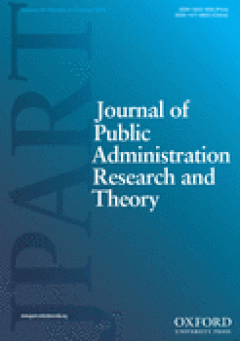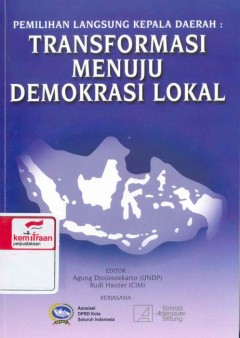Filter by

The Politics of Detection in Business Regulation
Detecting noncompliant behaviors is an important step in the enforcement of regulations. The literature on the subject is vast yet also narrow in its approach, in the sense that it has built on the assumption that regulators would always want to maximize information quantity and quality, while acting under two fundamental constraints: the regulator’s resources and the information asymmetry betw…
- Edition
- Volume 25, Number 1, January 2015 p. 257-284
- ISBN/ISSN
- 10531858
- Collation
- -
- Series Title
- Journal of Public Administration Research and Theory
- Call Number
- -

New Leaders’ Managerial Background and the Performance of Public Organizati…
We develop a theory of the effect of top management succession on the performance of public organizations. The theory is rooted in the fundamental characteristics of an organization’s publicness: ownership, funding, and regulation. We construct the concept of publicness fit—the match between the organization and the leader’s previous managerial experience. We argue that the effect of publicness…
- Edition
- Volume 25, Number 1, January 2015 p. 217-236
- ISBN/ISSN
- 10531858
- Collation
- -
- Series Title
- Journal of Public Administration Research and Theory
- Call Number
- -

Transactional Authority and Bureaucratic Politics
Bureaucratic politics research couched within the new institutionalism paradigm has largely focused on principal authority rooted in formal (institutional) mechanisms that are ultimately both devised and chosen by politicians. A nascent literature has emerged over the past two decades whose underpinnings reflect increasing gravitation towards a transactional authority perspective, one that is c…
- Edition
- Volume 25, Number 1, January 2015
- ISBN/ISSN
- 10531858
- Collation
- p. 5-26
- Series Title
- Journal of Public Administration Research and Theory
- Call Number
- -

Bureaucratic Politics Arising From, Not Defined by, a Principal–Agency Dyad
We contrast two archetypal modes of research in principal-agency theory and in public administration: an aggregated mode which regards the agency as a unified whole, and a disaggregated mode attending to individuals. We argue for the virtues of the latter approach in that mechanisms are clear, verifiable, and specific. The aggregated approach may also be clear, at the cost of submerging interna…
- Edition
- Volume 25, Number 1, January 2015 p. 27-42
- ISBN/ISSN
- 10531858
- Collation
- -
- Series Title
- Journal of Public Administration Research and Theory
- Call Number
- -

Institutional Effects of Changes in Political Attention: Explaining Organizat…
All democratic countries have ministries for issues like foreign affairs, defense, transportation, education, and social affairs. Yet, we know little about what determines the number and issue content of ministries. Why do some policy issues have their own ministry while others do not and when are new ministries created? The article offers a theoretical argument for how creation and termination…
- Edition
- Volume 25, Number 1, January 2015 p. 165-190
- ISBN/ISSN
- 10531858
- Collation
- -
- Series Title
- Journal of Public Administration Research and Theory
- Call Number
- -

A Conceptual Framework for Analysis of Goal Ambiguity in Public Organizations
Prominent authors have claimed that government organizations have high levels of goal ambiguity, but these claims have needed clarification and verification. We discuss the complexities of organizational goals and their analysis, and review many authors’ observations about public agencies’ goal ambiguity and its good and bad effects. Then, we propose a conceptual framework to organize and make …
- Edition
- Volume 25, Number 1, January 2015 p. 71-100
- ISBN/ISSN
- 10531858
- Collation
- -
- Series Title
- Journal of Public Administration Research and Theory
- Call Number
- -

This Could Be the Start of Something Big: Linking Early Managerial Choices wi…
The influence of early events in the history of a country, a social phenomenon, or an organization on later developments has received significant attention in many social science disciplines. Often dubbed “path dependence,” this influence occurs when early events influence later outcomes even when the original events do not reoccur. “Path dependence,” however, has received little theoretical or…
- Edition
- Volume 25, Number 1, January 2015 p.135-164
- ISBN/ISSN
- 10531858
- Collation
- -
- Series Title
- Journal of Public Administration Research and Theory
- Call Number
- -

Local Government Management and Performance: A Review of Evidence
Local governments play a critical role in delivering services to the public. Over recent decades scholars have begun to empirically examine the relationship between the management and performance of local governments, locating this in economic, contingency, and resource-based theoretical frameworks. In this study, we undertake a comprehensive assessment of what is currently known about the mana…
- Edition
- Volume 25, Number 1, January 2015 p. 101-134
- ISBN/ISSN
- 10531858
- Collation
- -
- Series Title
- Journal of Public Administration Research and Theory
- Call Number
- -

Administrative Burden: Learning, Psychological, and Compliance Costs in Citiz…
This article offers two theoretical contributions. First, we develop the concept of administrative burden as an important variable in understanding how citizens experience the state. Administrative burden is conceptualized as a function of learning, psychological, and compliance costs that citizens experience in their interactions with government. Second, we argue that administrative burden is …
- Edition
- Volume 25, Number 1, January 2015 p. 43-70
- ISBN/ISSN
- 10531858
- Collation
- -
- Series Title
- Journal of Public Administration Research and Theory
- Call Number
- -

Predicting Public Sector Accountability: From Agency Drift to Forum Drift
Principal-agent theory has been the dominant theory at the heart of public sector accountability research. The notion of the potentially drifting agent—such as independent public agencies, opaque transnational institutions, or recalcitrant street-level bureaucrats—has been the guiding paradigm in empirical accountability research. The aim of this article is first of all to signal the limits of …
- Edition
- Volume 25, Number 1, January 2015 p. 191-216
- ISBN/ISSN
- 10531858
- Collation
- -
- Series Title
- Journal of Public Administration Research and Theory
- Call Number
- -

Kapita selekta dan beban biaya sosial korupsi
Komisi Pemberantasan Korupsi (KPK), menyadari bahwa sebagai institusi yang diberi kewenangan memberantas tindak korupsi di negeri ini tak akan mampu berjalan sendiri. Terlebih ke depan, kita lebih mengedepankan upaya pencegahan di samping penindakan yang selama ini dilakukan. KPK butuh dukungan seluruh elemen bangsa untuk sama-sama mengetaskan bangsa ini dari cengkeraman tindakan busuk para kor…
- Edition
- -
- ISBN/ISSN
- -
- Collation
- xi, 108 p. ; ill. ; tab. ; 20 cm.
- Series Title
- Membangun generasi anti korupsi
- Call Number
- 364.132 3 TIM k

Pengaduan masyarakat terindikasi tipikor
Komisi Pemberantasan Korupsi (KPK), menyadari bahwa sebagai institusi yang diberi kewenangan memberantas tindak korupsi di negeri ini tak akan mampu berjalan sendiri. Terlebih ke depan, kita lebih mengedepankan upaya pencegahan di samping penindakan yang selama ini dilakukan. KPK butuh dukungan seluruh elemen bangsa untuk sama-sama mengetaskan bangsa ini dari cengkeraman tindakan busuk para kor…
- Edition
- -
- ISBN/ISSN
- -
- Collation
- ix, 53 p. ; ill. ; tab. ; 20 cm.
- Series Title
- Membangun generasi anti korupsi
- Call Number
- 364.132 3 TIM p

Pengantar gratifikasi
Komisi Pemberantasan Korupsi (KPK), menyadari bahwa sebagai institusi yang diberi kewenangan memberantas tindak korupsi di negeri ini tak akan mampu berjalan sendiri. Terlebih ke depan, kita lebih mengedepankan upaya pencegahan di samping penindakan yang selama ini dilakukan. KPK butuh dukungan seluruh elemen bangsa untuk sama-sama mengetaskan bangsa ini dari cengkeraman tindakan busuk para kor…
- Edition
- -
- ISBN/ISSN
- -
- Collation
- vii, 137 p. ; ill. ; tab. ; 20 cm.
- Series Title
- Membangun generasi anti korupsi
- Call Number
- 364.132 3 TIM p

Pengantar laporan harta kekayaan penyelenggara negara
Komisi Pemberantasan Korupsi (KPK), menyadari bahwa sebagai institusi yang diberi kewenangan memberantas tindak korupsi di negeri ini tak akan mampu berjalan sendiri. Terlebih ke depan, kita lebih mengedepankan upaya pencegahan di samping penindakan yang selama ini dilakukan. KPK butuh dukungan seluruh elemen bangsa untuk sama-sama mengetaskan bangsa ini dari cengkeraman tindakan busuk para kor…
- Edition
- -
- ISBN/ISSN
- -
- Collation
- ix, 98 p. ; ill. ; tab. ; 20 cm.
- Series Title
- Membangun generasi anti korupsi
- Call Number
- 364.132 3 TIM p

Pengantar kelembagaan anti korupsi
Komisi Pemberantasan Korupsi (KPK), menyadari bahwa sebagai institusi yang diberi kewenangan memberantas tindak korupsi di negeri ini tak akan mampu berjalan sendiri. Terlebih ke depan, kita lebih mengedepankan upaya pencegahan di samping penindakan yang selama ini dilakukan. KPK butuh dukungan seluruh elemen bangsa untuk sama-sama mengetaskan bangsa ini dari cengkeraman tindakan busuk para kor…
- Edition
- -
- ISBN/ISSN
- -
- Collation
- ix, 132 p. ; ill. ; tab. ; 20 cm.
- Series Title
- Membangun generasi anti korupsi
- Call Number
- 364.132 3 TIM p

Creating Business Plans
- Edition
- -
- ISBN/ISSN
- 9781625272225
- Collation
- viii, 141p.; 18 cm
- Series Title
- -
- Call Number
- 658.4 HAR c
- Edition
- -
- ISBN/ISSN
- 9781625272225
- Collation
- viii, 141p.; 18 cm
- Series Title
- -
- Call Number
- 658.4 HAR c

Social Psychology
- Edition
- -
- ISBN/ISSN
- 9780393913231
- Collation
- xxii, 621p.; 27 cm
- Series Title
- -
- Call Number
- 300 GIL s
- Edition
- -
- ISBN/ISSN
- 9780393913231
- Collation
- xxii, 621p.; 27 cm
- Series Title
- -
- Call Number
- 300 GIL s

HBR guide to persuative presentations
- Edition
- -
- ISBN/ISSN
- 978-1-4221-8710-4
- Collation
- xvii, 227p.; 23 cm
- Series Title
- -
- Call Number
- 658.4 HAR h
- Edition
- -
- ISBN/ISSN
- 978-1-4221-8710-4
- Collation
- xvii, 227p.; 23 cm
- Series Title
- -
- Call Number
- 658.4 HAR h

Lanskap otonomi daerah : analisa dan kritik
Sejak awal, hadirnya UU No. 32/2004 sudah terlihat betapa pihak yang paling diuntungkan adalah elit lokal dan nasional. Semangat UU ini lebih banyak dalam bidang distribusi kekuasaan dan pembagian keputusan ketimbang memberikan otonomi kearah kemandirian daerah. Ini tetap saja intinya menyangkut pemerintahan, serta bukan otonomi dalam artian yang lebih luas. Hany saja, apa yang disebut pemerint…
- Edition
- -
- ISBN/ISSN
- 979-98221-2-2
- Collation
- xiv, 198p.; 23 cm
- Series Title
- -
- Call Number
- 352, PIL, l

Pemilihan langsung kepala daerah: transformasi menuju demokrasi lokal
- Edition
- -
- ISBN/ISSN
- -
- Collation
- xiii, 139p.; 21 cm
- Series Title
- -
- Call Number
- 352, DJO, p
- Edition
- -
- ISBN/ISSN
- -
- Collation
- xiii, 139p.; 21 cm
- Series Title
- -
- Call Number
- 352, DJO, p
 Computer Science, Information & General Works
Computer Science, Information & General Works  Philosophy & Psychology
Philosophy & Psychology  Religion
Religion  Social Sciences
Social Sciences  Language
Language  Pure Science
Pure Science  Applied Sciences
Applied Sciences  Art & Recreation
Art & Recreation  Literature
Literature  History & Geography
History & Geography